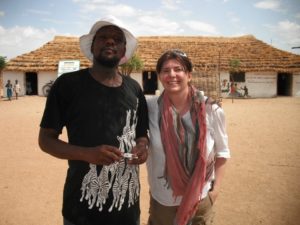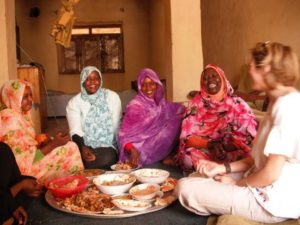International Careers - curious about a career in international development?
As it is International Careers Week we will be sharing two exciting blog entries written by professionals working in international development. Yesterday we had Katherine who works in a NGO in Uganda. Today we will publish the first of two blog entries from Catherine Stow, an Organisational Development (OD) and Leadership Consultant and Coach who has spent the last 15 years working in International Development. Please read her bio at the bottom of the page.
Firstly, can you tell me a little bit about yourself and where you work?
For the last 15 years I have worked in Organisational Development predominantly working in the Global Development sector either with humanitarian organisations and NGOs, the United Nations or International Organisations. This has given me some fantastic opportunities to work in field offices, supporting partners and colleagues on the ground as well as in Head Offices across Africa, Asia and the UK. My last role was as Head of Organisational Development for an International Organisation supporting democracy and development in 51 countries where I worked with colleagues from over 40 nationalities. More recently I have started an independent consultancy and am currently coaching and mentoring individuals within the sector, either working with senior leaders in the UK and Overseas, graduates wanting to break into Social Development or those eager to make a career change.
You specialise in the discipline of Learning and Development and Organisational Development (OD). Can you explain what that means in the context of the International Development Sector?
Organisational Development (OD) is a very broad area and is applied differently across sectors and geographical regions but in general OD practitioners support organisations to develop people, systems, structures, cultures and leadership in order to operate as efficiently and effectively as possible. For the global development sector this might involve designing and delivering training programmes to staff and partners in the field, coaching new staff in hard-ship locations, working with organisations to define their core mission and values and designing strategies that recognise, reward and retain some of the most talented people across the globe.
Can you give us some examples of the projects or roles you’ve worked on?
With such a variety of organisations operating in the sector I have had the opportunity to work on some really interesting and diverse projects. Some examples of these include: supporting two national NGOs in Darfur to strengthen their core organisational processes, design and delivery of management training to local doctors and midwives in Liberia and Afghanistan, supporting local communities on the ground in Asia post-Tsumani, design and implement a global induction and online skills learning programme for staff and partners in a large International NGO, develop a Learning and Development strategy for an International organisation that was transitioning from a policy making organisation to more of an advocacy-based one, work with a U.N. team in West Africa to review and re-develop a Government Training Institute in the field of money laundering and corruption, managed international recruitment for a large UK faith-based INGO and contributed to a UK national committee working to develop sector-wide competencies and professionalise the Development sector.
Like many people in the sector my career has not always followed a logical linear career path as the opportunities to progress aren’t always as available or as clear-cut as they might be in careers such as banking, law or education. Because of this you may often need to make lateral career moves, take roles in difficult locations and move between Development and other Sectors to gain valuable transferable skills when opportunities arise. If you like the idea of job security and logical promotional steps then this really isn’t the career for you!
What role did you most enjoy and why?
In one particular role I was Head of Learning and Development for a large UK based humanitarian organisation and was responsible for the learning and development of colleagues and partners in 16 of the world’s most fragile states such as Haiti, DRC, Afghanistan. Although my role was based in London I regularly visited our country programmes either to deliver training or to support local colleagues to plan, design and deliver their learning programmes or strategies.
Although this type of role is not something that people might automatically think of when they think of the development sector, such as a health practitioner or relief worker, it can be just as rewarding. To be able to support our colleagues on the ground who are working in difficult and very challenging situations feels great as does playing a part in making organisations and partners in the field stronger and more resilient. On a personal level it gave me opportunities to meet an extraordinary diverse bunch of people from all works of life working together to face difficult challenges and it has definitely changed the way I approach my work and life.
You have worked in several international organisations both in the UK and abroad, can you please share why and how you got into the field of international development?
I studied International Development for my undergraduate degree and spent the summers in-between interning with organisations in Africa, placements that I secured locally by travelling to Zimbabwe and Ghana. After graduating I knew I needed more skills and experience to improve my chances of a career in the sector – especially as I was pretty useless at languages. And so I trained as an English teacher and for the next 5 years I taught across Europe, Asia and South America learning some languages and finding some voluntary work on the way.
During one role as an English teacher in the Maldives (one of the better locations I taught!) I was offered a role in the Training department with a rapidly expanding international commercial organisation operating across Asia. Although it wasn’t International Development it gave me an opportunity to learn some key skills, and work in a values driven organisation with colleagues from over 14 nationalities. However, I still dreamed of working in International Development so after 3 years I returned to the UK to complete an MSC in Strategic Human Resources and OD with the clear goal of specialising in Social Development organisations.
Being in London meant I could access so many organisations and I approached as many as I could, offering to work part time on a voluntary basis. My lucky break came when one international organisation I was volunteering for had a short-term vacancy in their International recruitment team. During this time a permanent role was advertised within the team that I was able to apply for and things gradually went from there! After a while I managed to cross over from HR generalist roles to roles in OD that really interested me and I was seconded to a role in Darfur where I worked alongside partners to support and strengthen two national Sudanese NGOs.
Although it has, at times, felt a bit of an arduous journey I think my experience in both commercial and not-for-profits, at both Head Office and in the field, has really helped me add more value to the roles and organisations I’ve worked for. From a recruiter perspective I would definitely welcome candidates with varied backgrounds and experiences in different organisational cultures.
What are the current challenges within the field of international development that would be useful for our students to know?
The Global Development sector has been experiencing some fundamental changes, a trend which will undoubtedly continue over the coming years not least because of the impact climate change will continue to have on some of our most fragile parts of the world, the need to strengthen public health systems, the disruption to the sector caused by advances in technology and changes in the types of organisations operating in the sector.
Fragile Health systems, and the global response to public health emergencies, continue to pose a huge challenge as was evident in the recent Ebola crisis in West Africa. However, something that is often overlooked in the press is the increasing threat from non-communicable disease (NCDs) such as diabetes and heart disease that put a strain on health systems that are already struggling. The challenge for the Sector is to work with governments to find innovative ways to influence behaviour change at the individual level as well as champion key educational and health policy changes to reduce NCDs.
In the past, if you were employed in the sector you’d usually be working for either a local NGO, a large INGO, or government or Inter-governmental agency such as the UNDP or WHO. Now, the landscape is so much broader with a host of more informal actors such as corporate organisations and social enterprises all of whom who bring new skills, expertise and innovative ways of doing things to the sector. INGOs and other more “formal” actors in the sector will need to find new ways of collaborating with the more “in-formal” actors and build strong and robust partnerships if they are to remain relevant.
Finding innovative and effective ways to manage high volumes of data will continue to be a challenge. Utilising technology in a host of different ways such as mapping humanitarian disaster areas, improving election monitoring, improving early disaster warnings, assessing the effectiveness of national education programmes will all be important considerations for the sector and organisations will need to continue to find ways to collaborate in order to find the best outcomes.
And of course, for those experiencing the crises, the challenges remain as acute as ever. In many parts of the globe there is still poverty, hunger and disease causing widespread displacement of people and humanitarian crises like the conflicts we see today in Yemen, South Sudan and CAR which still rarely reach the mainstream press or public consciousness. In Yemen alone 4 million people are on the verge of starvation and 400,000 children with severe acute malnutrition and signs that the situation will only get worse. A dynamic, collaborative Global Development sector with organisations working together in more innovative and effective ways than before to deal with the challenges is clearly needed.
Make sure to tune in to the second part of this blog entry where Catherine will share her tips and advice for students interested in a career in international development and also share relevant links and resources. Read more about Catherine below.
BIO
Catherine Stow is an Organisational Development (OD) and Leadership Consultant and Coach who has spent the last 15 years working in International Development with a focus on supporting colleagues, partners and organisations to develop their skills, knowledge and expertise required for the International Development sector.
Catherine grew up near Bath and studied International Politics and Development at University. She became interested in OD when she was working as an English Teacher overseas and was offered a role in the Training Department for a rapidly growing commercial business operating across Asia. After 3 years and some great international experience in the field of people development Catherine returned to the UK to complete her MSc at the London School of Economics and committed to put her skills and knowledge to use within the International Development sector.
That was 12 years ago and her experiences working in across Asia, Africa and Europe in people and organisational development roles have encouraged her to establish a consultancy coaching and mentoring individuals and supporting organisations within the Social Development field.
The Careers Service thanks Catherine for her support in writing this blog entry.
Respond


